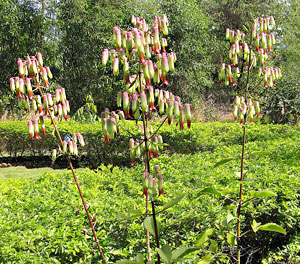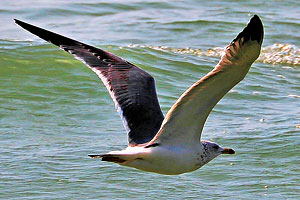|
|
Goa Wildlife
............................................................................................................ |
|
The rugged Western Ghats make it an ideal
haven for many species of birds and animals and also provide a
corridor for migration. The western ghats called the Sahyadris
in Goa, extend for a total of 600 kms in Goa of their total
length of 3702 kms. The widest belt of forests along the
western Ghats is in Goa and neighbouring Karnataka state. The
coastal areas provide the tropical backdrop. There are several
plants and trees unique to Goa and some introduced by the
Portuguese, most famous of which is the green Chillies, which
today has become an essential ingredient in the Indian Curry.
Average rainfall is over 500 mm along the western ghats and a
little less elsewhere. The length of the dry season averages
from 5 to 6 months. For all these reasons, the dominant
vegetation is of the moist decidous type.
Goa is endowed with over 1512 documented species of plants,
over 275 genera of birds, over 48 genera of animals and over
60 genera of reptiles. About 10% of Goa is set aside as
wildlife reserve and this area includes four large wildlife
sanctuaries. |
|
|
|
Plants & Trees
Goa has more than 3000 different species of flowering
plants not counting the hundreds of varieties of
grasses, ferns and brackens. The most famous tree is the
coconut palm, which is in abundance everywhere, from the
swaying ranges at the coast to the huge plantations in
the rural interior. Cashew nut and mango trees are also
seen in large privately owned plantations all over the
state and supply a major portion of the export crop that
is shipped out of Goa. Goa has a magnificent range of
flowering trees and plants which are seen all over the
towns and
|
 |
|
|
villages in a
bewildering range of colours and sizes. During the period
before the monsoons, most of these are in full bloom, lending
Goa a colourful look. Among the other trees that are found in
abundance are the banyan, the peepal, sisso or martel, kharanj
and teak.
Animals
There are almost fifty species of mammals found in Goa. Among
the animals found here are the leopard, monkeys, cheetal or
spotted axis deer, sambar, barking deer, mouse deer, leopard
cat, Indian civet, gaur or Indian bison, sloth bear, Indian
porcupine, pangolin, slender loris, wild boar, striped hyena,
jackal, wild dog and mongoose. Goa has four species of bats.
Flying foxes are also present in large numbers. Most of these
are found in the rural interior areas. The Indian giant
squirrel, the smaller three-striped squirrel and the
five-striped palm squirrel are also found in most areas.
Long-beaked dolphins are quite often seen in the shallow
waters of Goa's more isolated beaches. Goa has a large
reptilian/amphibian population. This includes the ubiquitous
common house gecko, a variety of frogs and the quite rare
monitor lizard. Two species of crocodile are mostly found
along the banks of a few inland waterways. Twenty-three
species of snakes are found in Goa. Some of the snakes are
common blind snake, the Russell sand boa, the Indian python,
the Indian wart snake, trinket snake, Indian rat snake, golden
tree snake. Among the few venomous snakes in Goa are the king
cobra, the common Indian krait, the coral snake, the Russell's
viper, the saw-scaled viper and the bamboo pit viper.
Freshwater turtles and rare marine turtles which come ashore
between October and December to lay their eggs in the sand are
also found in Goa.
More... |
|
|
|
Birds
Goa has an abundant birdlife. There are some very
colourful species found in Goa and among these are the
stork-billed kingfisher, the breasted kingfisher, the
common kingfisher, the grass-green, blue and yellow
bee-eaters, the golden oriole, and the Indian roller,
Hoopes, purple sunbirds, and several kinds of bulbuls,
babblers and Drongos, paradise flycatcher. The snowy
white cattle egret, the large egret and the
|
 |
|
|
little egret
and herons are most common in the paddy fields along with cows
and buffaloes. The beautiful whitebellied fish eagle, the
Brahminy kite and the pariah kite are birds of prey found
around towns and fishing villages. House crows, jackdaws, king
vultures and the white-backed vulture are also seen in most
areas. In the state's forests are found the grey hornbill, the
Indian pied hornbill and the magnificent great pied hornbill,
the lesser goldenback woodpecker, the Indian great black
woodpecker, the red junglefowl. |
|